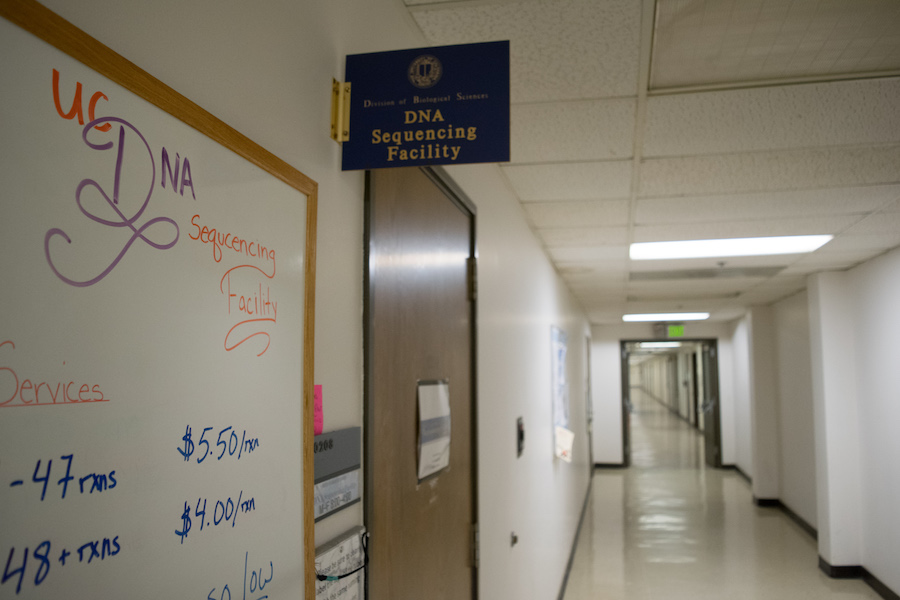
UC Davis DNA Sequencing Facility provides services for researchers.
When researchers in Davis need DNA analyzed, they need not go far. UC Davis’ College of Biological Sciences has its very own UC DNA Sequencing Facility to get the job done.
“[The facility] facilitates the researchers’ work here and [tries] to give them a local place that they can drop off and get results back for DNA sequencing as fast as possible,” said Sheryl Bernauer, the manager of the UC DNA Sequencing Facility Lab.
According to its website, the facility is committed to providing quality sequencing and service to all UC campus research facilities.
“We try to really make their quality the best and make sure we also give them feedback because some of them have not done this before,” Bernauer said. “If we see something that they can improve, we actually include notes with all of their reactions and results.”
Shelley Williams, a UC DNA Sequencing Facility research associate, believes that customer service is what makes them stand out from other sequencing facilities.
“We really try to go the extra mile for people and a lot of sequencing companies won’t do that,” Williams said. “You give them money, they sequence your DNA and give you back your results. We troubleshoot, we have 20-plus years of experience in troubleshooting and that’s what sets us apart from other companies.”
The facility offers two different types of services: DNA sequencing and fragment analysis. Fragment analysis is seen more commonly in forensics, in which bands are analyzed to predict the size of the DNA.
According to Bernauer, the facility does not run into many problems; however, many do not understand the time and patience it takes to sequence DNA. It usually takes one business day for DNA to be sequenced and returned, but sometimes customers have different preconceived notions.
“There [are] always different sorts of expectations that people have,” Bernauer said. “They think we can turn stuff around in one afternoon but that doesn’t happen.”
The facility always makes sure that their product turns out as good as possible. When people offer very strong or very weak DNA, it can unbalance the reaction that takes place during the procedure. An equilibrium allows for the longest read possible.
“There are certain organisms that are more challenging to sequence than others by nature of the content of their DNA,” Williams said. “There [are] a bunch of different things that could attribute to something being difficult to sequence. We get so many different types of DNA, and not only that, but we get different researchers doing different protocols on prepping their DNA.”
Therefore, Williams said that they have no control of what comes through their doors.
“The challenge is to make as much as we can — with our hundreds of customers — work the best we can,” Williams said. “We do a really good job at that; that’s why we have so many customers that keep coming back to us.”
The facility is self-supporting, meaning that the business that customers bring in pays for everything, including salaries. The facility also employs students and interns as lab assistants. Typically, students are hired as sophomores and stay at the facility until they graduate. This long-term position allows for the development of close relationships amongst the students themselves.
“We kind of adopt them; they know they can drop in anytime,” Bernauer said. “They sometimes use this place as a study place if they need to get away and have a quiet place. And almost always, it’s kind of synergistic in how they get these other good habits, good studying and hints and tips from other students as well during their career here.”
Fourth-year genetics and genomics major and senior lab assistant Janel Merkel has been a lab assistant since the summer after her first year at UC Davis. She considers the facility her “home base.”
“It’s my rock,” Merkel said. “As everything changes throughout these four years, this has always been my place, my people.”
What Merkel enjoys most about working at the facility is the ability to work with DNA and to truly understand what the sequencing means.
“Just knowing that DNA is suspended in a tiny little drop of water and putting it in a tiny well on a plate and we’re going to sequence it and out comes this amazing genetic data,” Merkel said. “It has really helped me with my science communication skills.”
For over three decades, the UC DNA Sequencing Facility’s business has been going strong due to the quality of their DNA sequencing and customer service, and it hopes to continue serving the community for years to come.
Written by: Jacqueline Chu – features@theaggie.org







